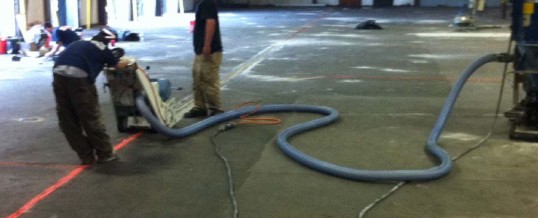
Concrete is a durable flooring choice that can withstand a variety of abuses and maintain its appearance for decades. However, concrete can become damaged over time, particularly in high-traffic areas. If your floors are looking less than their best, you may be considering concrete resurfacing. Find out what this process entails and whether it is right for your business.
1. What Causes Concrete Damage?
Concrete is a porous material that is made of coarse granular aggregate material, water, and a binding agent such as cement. There may also be additives such as minerals or chemical admixtures to create a different texture. Damage occurs when debris and moisture work their way into the open spaces, either during the installation or afterward. When water soaks in, it causes the mixture to separate.
The addition of temperature changes can cause it to expand and contract. Abrasive materials can also cause the components to break down. These include chlorides, sulfates, and chemicals. Physical elements can also damage concrete. Heavy objects can cause it to crack or chip, whether that is from repeated heavy vehicle traffic or a single, blunt force impact.
2. How Does Concrete Resurfacing Work?
Different concrete resurfacing techniques can be successful, depending on the cause of damage. First, the damaged areas must be removed. This requires the use of specialized equipment, such as grinders, chipping hammers, scarifiers, shavers, or shot blasters. Next, the surface must be reshaped and filled-in using self-leveling cementitious overlays, epoxy trowel downs, or similar. It is important to address the cause of damage as well. When the cause is not prevented, the damage can return.
3. What are the Benefits of Concrete Resurfacing?
Concrete resurfacing has several benefits, including cosmetic and safety. When small cracks or chips appear in your concrete floor, they may not be hazardous, but are unattractive. Repairing at this point is simple and can give your floors a like-new appearance. When the damage is more advanced, concrete resurfacing ensures that you have an appropriately level and flat surface. Concrete resurfacing is often a more affordable option when compared to replacement and takes a short time to complete.
4. What are the Alternatives to Concrete Resurfacing?
In some cases, concrete resurfacing may not be the best option. When damage has been caused by fire, radiation, or other severe circumstances, it may be necessary to completely replace the area. At this stage, all existing concrete must be removed and a new floor installed. In outdoor areas, other materials such as gravel or stonework may be an alternative. Consider the usage of the space and the level of maintenance your new groundcover will require.
5. How Can Further Damages Be Prevented?
Perhaps the most important element of concrete resurfacing is to ensure that the damage is not repeated. An effective means of doing so is to add a concrete coating. This is a clear or colored material made from epoxy or similar that coats and seals the surface. This adds durability as well as proofing against water, oil, chemicals, and heavy traffic. In some cases, when the cause of the damage is corrosion from water or minerals, it may be necessary to address that factor separately.
Our company is skilled in both resurfacing and coatings for concrete areas of all sizes. If you think that concrete resurfacing might be the right option for your business, contact us today. Simply enter your information in the Got a Project form. We will contact you shortly to provide a brief no-cost evaluation. Our team can provide you with several options for your project that meet your needs, fit your work schedule, and follow your budgetary requirements. Our service area includes Bangor, ME; Manchester, NH; Worcester, MA; Albany, NY; and several surrounding metro areas.
Concrete Flooring Service Area
ICS provides concrete solutions to all of the northeast. Here is a small list of cities and towns where we have completed many industrial and commercial concrete flooring company applications.
| Portland, Maine | Bangor, Maine | Augusta, Maine |
| Nashua, New Hampshire | Manchester, New Hampshire | Portsmouth, New Hampshire |
| Boston, Massachusetts | Worecester, Massachusetts | Springfield, Massachusetts |
| Burlington, Vermont | Montpelier, Vermont | St. Johnsbury, Vermont |
| Providence, Rhode Island | Warwick, Rhode Island | Cranston, Rhode Island |
| Hartford, Connecticut | New Haven, Connecticut | Stamford, Connecticut |
| New York | New Jersey | Pennsylvania |
